- Home
- P. D. James
Death in Holy Orders Page 32
Death in Holy Orders Read online
Page 32
She recognized that he was trying to make it easy for her, that he didn’t want to impose, but that he knew how much she dreaded being alone. She said, “But won’t that be a terrible nuisance? You’ll have an uncomfortable night.”
“I shall be very comfortable. I’m used to sleeping in armchairs.”
The bedroom in Jerome was almost identical to the one next door. The bedside lamp was switched on and she saw that he had not taken his books. He had been reading or surely it must have been rereading Beowulf. There was an old and faded Penguin paperback, David Cecil’s Early Victorian Novelists with a photograph of the writer, looking ridiculously young, and on the back the price in old money. So, like her, she thought, he enjoyed picking up books in second-hand shops. The third book was Mansfield Park. She wondered whether to take them down to him, but was reluctant to intrude now that they had said their good-nights.
It was strange to be lying on his sheet. She hoped that he didn’t despise her for her cowardice. The relief of knowing that he was downstairs was immense. She closed her eyes on darkness, not on the dancing images of death, and in minutes she was asleep.
She awoke after a dreamless night and saw from her watch that it was seven o’clock. The set was very quiet and when she went downstairs she saw that he had already left, taking the duvet and pillow with him. He had opened the window as if anxious that not even the faintest trace of his breath should remain. She knew that he would tell no one where he had spent the night.
BOOK THREE
VOICES FROM THE PAST
Ruby Pilbeam needed no alarm clock. For eighteen years she had woken, winter and summer, at six o’clock. She did so on Monday morning, stretching out her hand to switch on the bedside light. Immediately Reg stirred, pushed back the bedclothes and began to edge out of the bed. There came to Ruby the warm smell of his body, bringing as always its familiar comfort. She wondered if he had been asleep or just lying still, waiting for her to move. Neither had slept except for brief periods of restless half-slumber, and at three o’clock they had got up and gone down to the kitchen to drink tea and wait for the morning. Then exhaustion had mercifully taken over from shock and horror and at four o’clock they had gone back to bed. They had then slept fitfully, but they had slept.
Both had been busy all Sunday, and only the ceaseless purposeful activity had given that dreadful day any semblance of normality. Last night, huddled together at the kitchen table, they had talked about the murder, whispering as if those small comfortable rooms of St. Mark’s Cottage were crammed with secret listeners. The talk had been guarded with suspicions unvoiced, broken sentences and periods of unhappy silence. Even to say that it was absurd to suggest that anyone at St. Anselm’s could be the murderer was to associate place and deed in treasonable proximity; to speak a name even in exoneration was to admit the thought that someone resident in college could have perpetrated such evil.
But they had arrived at two possible theories, the more comforting because they induced belief. Together before returning to bed they had mentally rehearsed the stories like a mantra. Someone had stolen the keys to the church, someone who had visited St. Anselm’s, perhaps months earlier and knew where they were kept and that Miss Ramsey’s office was never locked. The same person had made an assignation with Archdeacon Crampton before he arrived on Saturday. Why meet in the church? What better place? They couldn’t meet in the guest set without risk and there was nowhere private on the headland. Perhaps the Archdeacon had himself taken the keys and unlocked the church ready for his visitor. Then the arrival, the quarrel, the murderous rage. Perhaps the visitor had planned murder, had come with a weapon, a gun, a cosh, a knife. They hadn’t been told how the Archdeacon had died, but both privately visualized the flash and thrust of a knife blade. And then the escape, a climb over the iron gate, leaving as he had entered. The second theory was even more plausible, adding weight to reassurance. The Archdeacon borrowed the keys and had gone to the church for purposes of his own. The intruder was a thief seeking to steal the altar picture or the silver. The Archdeacon had surprised him and the thief, in terror, had struck. This explanation once tacitly accepted as rational, neither Ruby nor her husband spoke again that night of the murder.
Usually Ruby went alone to the college. Breakfast wasn’t until eight o’clock following the seven-thirty Mass, but Ruby liked to get started with planning her day. Father Sebastian breakfasted in his own sitting-room and there was his table to be laid ready for his invariable first meal of fresh orange juice, coffee and two whole meal slices of toast with Ruby’s home-made marmalade. At eight-thirty Mrs. Bardwell and Mrs. Stacey, her daily domestic helpers, would arrive from Reydon, driven by Mrs. Bardwell in her old Ford. But not today. Father Sebastian had telephoned them both and asked them to delay their return for a couple of days. Ruby wondered what explanation he had given, but hadn’t liked to ask. It meant more work for her and Reg, but Ruby was glad to be spared their avid curiosity, their speculations, their inevitable exclamations of horror. It occurred to her that murder might even be enjoyable for people who didn’t know the victim and weren’t under suspicion. Elsie Bardwell would certainly make the most of it.
Usually Reg came over to the house later than six-thirty, but today they left St. Mark’s Cottage together. He gave no explanation but she knew why it was. St. Anselm’s was no longer a safe and holy place. He shone the beam of his strong torch along the beaten-grass path to the iron gate leading to the west court. The faint haze of first light was creeping over the scrubland, but it seemed to her that she walked in an impenetrable darkness. Reg shone his torch on the gate to find the keyhole. Beyond the gate the row of dim lights in the cloisters illumined the slender pillars and cast shadows over the stone paths. The north cloister was still taped and half its length was now free of leaves. The trunk of the horse-chestnut rose black and still from the welter of fallen leaves. When the beams of the torch briefly passed over the fuchsia on the east wall its red flowers glistened like drops of blood. In the corridor which separated her sitting-room from the kitchen, Ruby put out her hand to switch on the light. But the darkness wasn’t total. Ahead the corridor was lit by a beam of light from the open cellar door.
She said, “That’s funny, Reg. The cellar door’s open. Someone’s up early. Or didn’t you see that it was shut last night?
He said, “It was shut last night. D’you think I’d have left it open?”
They moved to the head of the stone stairs. They were brightly lit by powerful overhead lights and fitted with a strong wooden handrail on each side. At the bottom of the steps, clearly seen in the glare from the light, was the sprawled body of a woman.
Ruby gave a sharp protesting cry.
“Oh God, Reg! It’s Miss Betterton.”
Reg pushed Ruby aside. He said, “Stay here, lass,” and she heard the clatter of his shoes on the stone. She hesitated only for a few seconds, then followed him down, clutching with both hands at the left handrail and together they knelt by the body.
She was lying on her back, her head towards the bottom step. There was a single gash to her forehead, but only an oozing of dried blood and serum. She was wearing a faded dressing-gown in paisley wool and under it a white cotton night-dress. Her thin grey hair stuck out from the side of her head in a plait, the wispy end held together by a twisted rubber band. Her eyes, fixed on the top of the stairs, were open and lifeless.
Ruby whispered, “Oh dear God, no! You poor soul, you poor soul.”
She put an arm across the body in an instinctive gesture which she knew at once was futile. She could smell in the hair and from the dressing-gown the sour smell of unkempt old age and wondered that this should remain of Miss Betterton when all else had gone. Choked with a hopeless pity she withdrew her arm. Miss Betterton would not have wanted her touch in life; why impose it on her in death?
Reg straightened up. He said, “She’s dead. Dead and cold. Looks like she broke her neck. There’s nowt anyone can do for her. You’d better go for
Father Sebastian.”
The task of waking Father Sebastian, of finding words to speak and the strength to speak them, horrified Ruby. She would much rather that Reg broke the news, but that would mean she would have to stay alone by the body and this prospect was even more frightening. For the first time fear took over from pity. The recesses of the cellar stretched away, great areas of blackness in which imagined horrors lurked. She was not an over-imaginative woman, but now it seemed that the familiar world of routine, of conscientious work, of fellowship and of love was dissolving about her. She knew that Reg only had to stretch out a hand and the cellar, with its whitewashed walls and labelled racks of wine bottles, would become as familiar and harmless as it was when she and Father Sebastian went down to bring up the bottles for dinner. But Reg didn’t stretch out his hand. Everything must be left as it was.
Every step seemed mountainous as she climbed the stairs on legs that had suddenly become almost too weak to support her. She switched on all the lights in the hall and stood for a moment gathering her strength before making her way up the two flights to Father Sebastian’s flat. Her knock was at first too tentative and she had to bang on the door before it was opened with disconcerting suddenness and Father Sebastian faced her. She had never seen him before in his dressing-gown and for a moment, disorientated by shock, thought that she was facing a stranger. The sight of her must have shocked him too, for he put out a hand to steady her and drew her into the room.
She said, “It’s Miss Betterton, Father. Reg and I found her at the bottom of the cellar stairs. I’m afraid she’s dead.”
She was surprised that her voice sounded so steady. Without speaking, Father Sebastian closed his door and hurried with her down the stairs, his hand supporting her arm. At the top of the cellar steps, Ruby waited and watched while he went down and said a few words to Reg, then knelt by the body.
After a moment he got to his feet. He spoke to Reg, his voice, as usual, calm, authoritative.
“This has been a shock for you both. I think it would be best if you went on quietly with your usual routine. Commander Dalgliesh and I will do what is necessary. It is only work and prayer that will get us through this terrible time.”
Reg climbed the steps to join her and together, without speaking, they went into the kitchen.
Ruby said, “I suppose they’ll be wanting breakfast as usual.”
“Of course they will, love. They can’t face the day on empty stomachs. You heard what Father Sebastian said, we’re to go on quietly with our usual routine.”
Ruby turned piteous eyes on him.
“It was an accident, wasn’t it?”
“Of course it was. It could have happened any time. Poor Father John. This will be terrible for him.”
But Ruby wondered. It would be a shock, of course, sudden death always was. But there was no denying that Miss Betterton couldn’t have been easy to live with. She reached for her white overall and began with a sad heart to prepare breakfast.
Father Sebastian went to his office and rang Dalgliesh in Jerome. His call was answered so quickly that it was obvious that the Commander was already up. He gave the news and, five minutes later, they stood together beside the body. Father Sebastian watched as Dalgliesh bent down, touched Miss Betterton’s face with practised hands, then stood up and looked down in silent contemplation.
Father Sebastian said, “Father John must be told, of course. That is my responsibility. I imagine that he’s still asleep but I must see him before he comes down to the oratory for Morning Prayer. This will hit him hard. She wasn’t an easy woman, but she was his only relation and they were close.” But he made no move to leave. Instead he asked, “Have you any idea when this happened?”
Dalgliesh said, “From the rigor mortis I would assume she has been dead about seven hours. The pathologist may be able to tell us more. It’s never possible to be precise from a superficial examination. There will, of course, have to be a post-mortem.”
Father Sebastian said, “She died after Compline, then, probably as late as midnight. Even so, she must have crossed the hall very quietly. But then she was always quiet. She moved like a grey shadow.” He paused, and added, “I don’t want her brother to see her here, not like this. Surely we could carry her to her room. She wasn’t a religious woman, I know. We must respect her sensibilities. She wouldn’t want to lie in the church even if it were open, nor, I think, in the oratory.”
“She must stay where she is, Father, until the pathologist has examined her. We have to treat this as a suspicious death.”
“But at least we can cover her up. I’ll find a sheet.”
“Yes,” said Dalgliesh, ‘we can certainly cover her.” As Father Sebastian turned to the stairs, he asked, “Have you any idea what she was doing here, Father?”
Father Sebastian turned back and hesitated, then he said, “I’m afraid I have. Miss Betterton helped herself to a bottle of wine on a fairly regular basis. All the priests knew about it and I imagine that the ordinands, perhaps even the staff, may have guessed. She never took more than one bottle about twice a week and it was never the best wine. Naturally I discussed the problem with Father John as tactfully as I could. I decided to take no action unless matters got out of hand. Father John regularly paid the price of the wine, at least of those bottles he discovered. Of course we realized the danger the steep steps posed for an elderly woman. That’s why we had the stairs so brightly lit and replaced the rope with the wooden rails.”
Dalgliesh said, “So finding you had a regular pilferer in the community, you provided a secure banister rail to facilitate the pilfering and to prevent her from breaking her neck.”
“Do you have difficulty with that, Commander?”
“No, given your priorities I don’t suppose I do.”
He watched as Father Sebastian made his way, firmly walking up the steps, and disappeared, closing the door behind him. That she had broken her neck a superficial examination made clear enough. She was wearing a pair of tight-fitting leather slippers and he had noticed that the sole of the right foot had curled away from the upper. The stairs were brightly lit and the light switch was at least two feet from the first step. Since the light had presumably been on when she fell, she could hardly have stumbled in darkness. But if she had tripped on the first step, surely she would have been found tumbled on the stairs either face downwards or on her back? On the third stair from the bottom he had detected what looked like a small smear of blood. From the position of the body it looked as if she had been hurled through the air, had struck her head on the stone step and somersaulted over. Surely it would be difficult for her to be flung with such force unless she had actually run with speed towards the steps. That, of course, was ridiculous. But what if she had been pushed? He felt a depressing and almost overwhelming sense of impotence. If this were murder, given that flapping sole, how could he ever hope to prove it? The death of Margaret Munroe was officially from natural causes. Her body had been cremated, her ashes buried or scattered on the earth. How expedient had this present death been for the murderer of Archdeacon Crampton?
But for now the experts in death would take over. Mark Ayling would be called to what might well be a second scene of crime, assessing the time of death, prowling round the body like a predator. Nobby Clark and his team would crawl over the cellar looking for clues they would be most unlikely to find. If there was something that Agatha Betterton had seen or heard, some knowledge which she had unwisely communicated to the wrong person, he was unlikely to learn it now.
He waited until Father Sebastian returned with a sheet which he laid reverently over the body, then the two of them climbed the cellar steps. Father Sebastian turned out the light and, stretching up, shot the bolt at the top of the cellar door.
Mark Ayling arrived with his usual promptness and more than his usual noise. Clattering through the hall with Dalgliesh, he said, “I hoped to bring the PM report on Archdeacon Crampton with me but it’s still being typed. Nothing in it
to surprise you. Death from multiple blows to the head inflicted by a heavy weapon with a sharp edge, i.e. the brass candlestick. Almost certainly killed by the second blow. Otherwise a healthy middle-aged male who could have looked forward to drawing his pension.”
He put on thin latex gloves before cautiously descending the cellar steps, but he didn’t this time wait to don his working overalls and his examination of the body, although not perfunctory, took little time.
At the end, getting to his feet, he said, “Dead about six hours. Cause of death: a broken neck. Well, you didn’t need to call me over to know that. The picture seems clear enough. She fell with force down the steps, struck her forehead on the third step from the bottom and was flung on to her back. I suppose you’re asking yourself the usual question: did she fall or was she pushed?”
“I thought of asking you.”
“On the face of it I’d say she was pushed, but you need something more definite than a first impression. I wouldn’t be prepared to swear to it in court. The steepness of the stairs is the problem. Could have been designed to kill old ladies. Given that slope, it’s perfectly possible that she didn’t actually touch the stairs until she struck her head near the bottom. I’d have to say that accidental death is at least as likely as murder. Why the suspicion, by the way? D’you think she saw something on Saturday night? And why was she going to the cellar anyway?”
Dalgliesh said cautiously, “She had a habit of wandering at night.”
“After the wine, was she ?”
Dalgliesh didn’t reply. The pathologist clicked shut his case. He said, “I’ll send an ambulance for her and get her on the table as soon as possible, but I doubt I’ll tell you anything you don’t know. Death seems to follow you about, doesn’t it? I take a job as lo cum pathologist while Colby Brooksbank is in New York getting his son married and I’m called out to more violent deaths than I usually autopsy in six months. Have you heard from the Coroner’s office yet about the date for the Crampton inquest?”

 The Skull Beneath the Skin
The Skull Beneath the Skin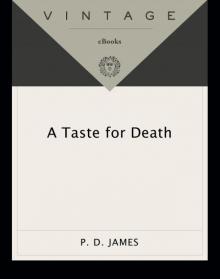 A Taste for Death
A Taste for Death The Children of Men
The Children of Men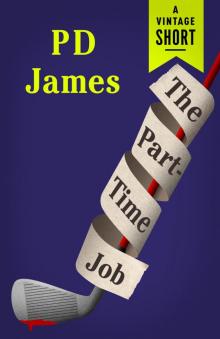 The Part-Time Job
The Part-Time Job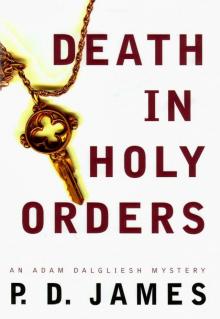 Death in Holy Orders
Death in Holy Orders The Victim
The Victim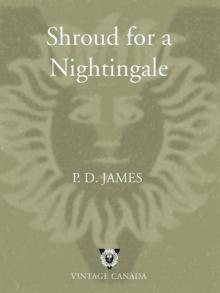 Shroud for a Nightingale
Shroud for a Nightingale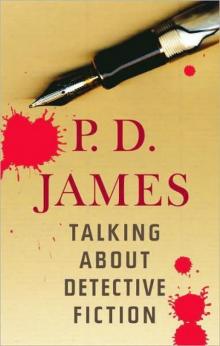 Talking about Detective Fiction
Talking about Detective Fiction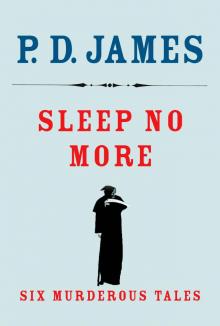 Sleep No More
Sleep No More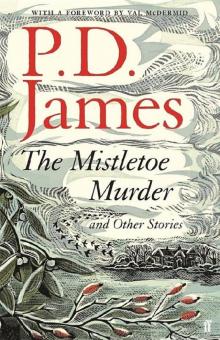 The Mistletoe Murder and Other Stories
The Mistletoe Murder and Other Stories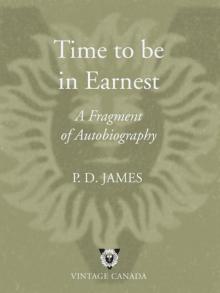 Time to Be in Earnest
Time to Be in Earnest Original Sin
Original Sin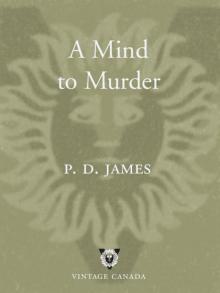 A Mind to Murder
A Mind to Murder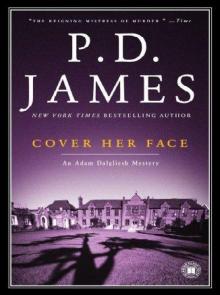 Cover Her Face
Cover Her Face Innocent Blood
Innocent Blood Devices and Desires
Devices and Desires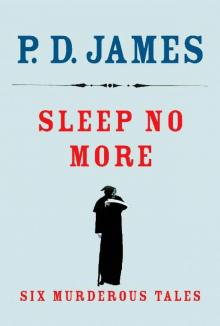 Sleep No More: Six Murderous Tales
Sleep No More: Six Murderous Tales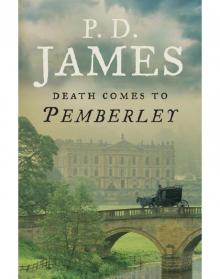 Death Comes to Pemberley
Death Comes to Pemberley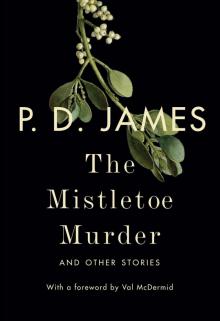 The Mistletoe Murder
The Mistletoe Murder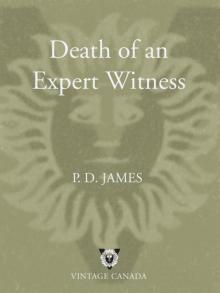 Death of an Expert Witness
Death of an Expert Witness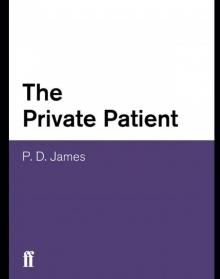 The Private Patient
The Private Patient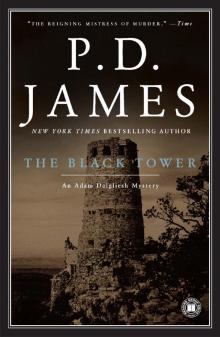 The Black Tower
The Black Tower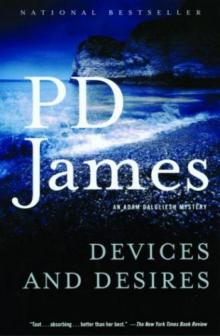 Devices & Desires - Dalgleish 08
Devices & Desires - Dalgleish 08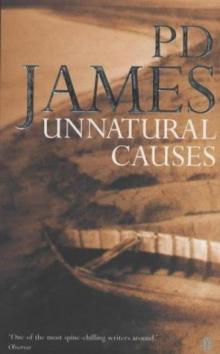 Unnatural Causes
Unnatural Causes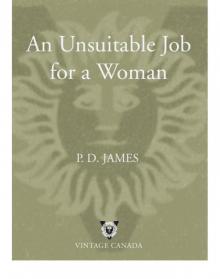 An Unsuitable Job for a Woman
An Unsuitable Job for a Woman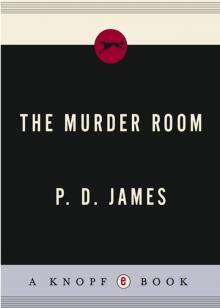 The Murder Room
The Murder Room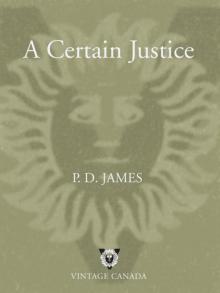 A Certain Justice
A Certain Justice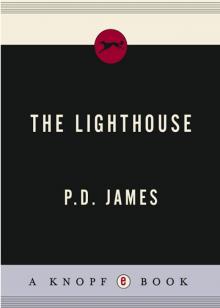 The Lighthouse
The Lighthouse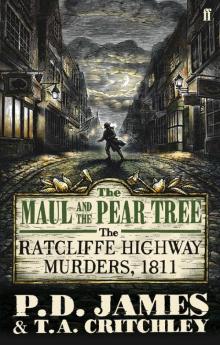 The Maul and the Pear Tree
The Maul and the Pear Tree